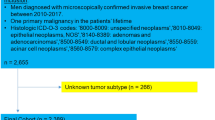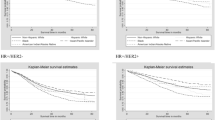Abstract
Purpose
Black breast cancer patients have worse clinical outcomes than their White counterparts. There are few studies comparing clinical outcomes between Black male breast cancer (MBC) and female breast cancer (FBC) patients. The objective of this study is to examine differences in presentation, treatment, and mortality between Black MBC and FBC.
Methods
The National Cancer Database was queried for all Black MBC and FBC patients, ages 18–90, with hormone receptor-positive breast cancer diagnosed between 2010 and 2016. Hormone receptor positivity was defined as estrogen receptor-positive, progesterone-positive and HER 2-negative cancer. Sociodemographic and clinical variables were compared between MBC and FBC patients on bivariable analysis. After propensity score matching, overall survival was evaluated using the log-rank test and Cox proportional hazards.
Results
Compared to FBC patients, MBC patients had higher rates of metastatic disease (stage 4, MBC 4.4% vs. FBC 2.6%, p < 0.001), larger tumors (tumor size < 2 cm, MBC 32.1 vs. FBC 49.1%, p < 0.001) and a higher percentage of poorly differentiated tumors (grade 3, MBC 28.5% vs. FBC 21.4%, p < 0.001). MBC patients had lower rates of hormone therapy (MBC 66.4% vs. FBC 80.7%, p < 0.001) and neoadjuvant chemotherapy (MBC 5.8% vs. FBC 7.5%, p = 0.05) than FBC. On propensity score matched analysis, Black MBC patients had a higher overall mortality (p25 of 60 months vs. 74 months) compared to FBC patients (p = 0.0260).
Conclusion
Among hormone receptor-positive Black MBC and FBC patients, there are sex-based disparities in stage, hormone therapy use and overall survival.

Similar content being viewed by others
Data availability
The National Cancer Database (NCDB) is a joint project of the Commission on Cancer (CoC) of the American College of Surgeons and the American Cancer Society. The CoC’s NCDB and the hospitals participating in the CoC’s NCDB are the source of the de-identified data used herein; they have not verified and are not responsible for the statistical validity of the data analysis or the conclusions derived by the authors.
Code availability
Not applicable.
References
DeSantis CE, Ma J, Goding Sauer A, Newman LA, Jemal A (2017) Breast cancer statistics, 2017, racial disparity in mortality by state. CA Cancer J Clin 67(6):439–448
Newman LA (2014) Breast cancer disparities: high-risk breast cancer and African ancestry. Surg Oncol Clin N Am 23(3):579–592
Wu X, Richardson LC, Kahn AR, Fulton JP, Cress RD, Shen T, Wolf HJ, Bolick-Aldrich S, Chen VW (2008) Survival difference between non-Hispanic black and non-Hispanic white women with localized breast cancer: the impact of guideline-concordant therapy. J Natl Med Assoc 100(5):490–498
DeSantis CE, Ma J, Gaudet MM, Newman LA, Miller KD, Goding Sauer A, Jemal A, Siegel RL (2019) Breast cancer statistics, 2019. CA Cancer J Clin 69(6):438–451
Daly B, Olopade OI (2015) A perfect storm: how tumor biology, genomics, and health care delivery patterns collide to create a racial survival disparity in breast cancer and proposed interventions for change. CA Cancer J Clin 65(3):221–238
Sparano JA, Wang M, Zhao F, Stearns V, Martino S, Ligibel JA, Perez EA, Saphner T, Wolff AC, Sledge GW Jr et al (2012) Race and hormone receptor-positive breast cancer outcomes in a randomized chemotherapy trial. J Natl Cancer Inst 104(5):406–414
Aggarwal A, Adepoju B, Yacur M, Maron D, Sharma MC (2021) Gender disparity in breast cancer: a veteran population-based comparison. Clin Breast Cancer. https://doi.org/10.1016/j.clbc.2021.01.013
Liu N, Johnson KJ, Ma CX (2018) Male breast cancer: an updated surveillance, epidemiology, and end results data analysis. Clin Breast Cancer 18(5):e997–e1002
Howlader N, Noone AM, Krapcho M, Miller D, Brest A, Yu M, Ruhl J, Tatalovich Z, Mariotto A, Lewis DR, Chen HS, Feuer EJ, Cronin KA (eds) SEER cancer statistics review, 1975–2018, National Cancer Institute. Bethesda, MD, https://seer.cancer.gov/csr/1975_2018/, based on November 2020 SEER data submission, posted to the SEER web site, April 2021
Ellington TD, Henley SJ, Wilson RJ, Miller JW (2020) Breast cancer survival among males by race, ethnicity, age, geographic region, and stage—United States, 2007–2016. Morb Mortal Wkly Rep 69(41):1481–1484
Reeder-Hayes KE, Anderson BO (2017) Breast cancer disparities at home and abroad: a review of the challenges and opportunities for system-level change. Clin Cancer Res 23(11):2655–2664
El Sayed R, El Jamal L, El Iskandarani S, Kort J, Abdel Salam M, Assi H (2019) Endocrine and targeted therapy for hormone-receptor-positive, HER2-negative advanced breast cancer: insights to sequencing treatment and overcoming resistance based on clinical trials. Front Oncol 9:510
Shen LS, Jin XY, Wang XM, Tou LZ, Huang J (2020) Advances in endocrine and targeted therapy for hormone-receptor-positive, human epidermal growth factor receptor 2-negative advanced breast cancer. Chin Med J (Engl) 133(9):1099–1108
Ballinger TJ, Meier JB, Jansen VM (2018) Current landscape of targeted therapies for hormone-receptor positive, HER2 negative metastatic breast cancer. Front Oncol. https://doi.org/10.3389/fonc.2018.00308
Sparano JA, Gray RJ, Makower DF, Pritchard KI, Albain KS, Hayes DF, Geyer CE, Dees EC, Goetz MP, Olson JA et al (2018) Adjuvant chemotherapy guided by a 21-gene expression assay in breast cancer. N Engl J Med 379(2):111–121
Albain KS, Gray RJ, Makower DF, Faghih A, Hayes DF, Geyer CE, Dees EC, Goetz MP, Olson JA, Lively T et al (2021) Race, ethnicity, and clinical outcomes in hormone receptor-positive, HER2-negative, node-negative breast cancer in the randomized TAILORx trial. J Natl Cancer Inst 113(4):390–399
Broman CL (1996) The health consequences of racial discrimination: a study of African Americans. Ethn Dis 6(1–2):148–153
Sellers RM, Shelton JN (2003) The role of racial identity in perceived racial discrimination. J Pers Soc Psychol 84(5):1079–1092
National Cancer Database. https://www.facs.org/quality-programs/cancer/ncdb. Accessed 31 July 2021
Daly B, Olopade OI, Hou N, Yao K, Winchester DJ, Huo D (2017) Evaluation of the quality of adjuvant endocrine therapy delivery for breast cancer care in the United States. JAMA Oncol 3(7):928–935
Yu E, Stitt L, Vujovic O, Joseph K, Assouline A, Younus J, Perera F, Tai P (2015) Male breast cancer prognostic factors versus female counterparts with propensity scores and matched-pair analysis. Cureus 7(10):e355
Anderson WF, Jatoi I, Tse J, Rosenberg PS (2010) Male breast cancer: a population-based comparison with female breast cancer. J Clin Oncol 28(2):232–239
Cardoso F, Bartlett JMS, Slaets L, van Deurzen CHM, van Leeuwen-Stok E, Porter P, Linderholm B, Hedenfalk I, Schröder C, Martens J et al (2018) Characterization of male breast cancer: results of the EORTC 10085/TBCRC/BIG/NABCG International Male Breast Cancer Program. Ann Oncol 29(2):405–417
Giordano SH (2018) Breast cancer in men. N Engl J Med 378(24):2311–2320
Miao H, Verkooijen HM, Chia KS, Bouchardy C, Pukkala E, Larønningen S, Mellemkjær L, Czene K, Hartman M (2011) Incidence and outcome of male breast cancer: an international population-based study. J Clin Oncol 29(33):4381–4386
Elimimian EB, Elson L, Li H, Liang H, Bilani N, Zabor EC, Statler A, Nahleh Z (2020) Male breast cancer: a comparative analysis from the National Cancer Database. World J. Men’s Health 39:506
Greif JM, Pezzi CM, Klimberg VS, Bailey L, Zuraek M (2012) Gender differences in breast cancer: analysis of 13,000 breast cancers in men from the National Cancer Data Base. Ann Surg Oncol 19(10):3199–3204
Yadav S, Karam D, Bin Riaz I, Xie H, Durani U, Duma N, Giridhar KV, Hieken TJ, Boughey JC, Mutter RW et al (2020) Male breast cancer in the United States: treatment patterns and prognostic factors in the 21st century. Cancer 126(1):26–36
Hershman DL, Kushi LH, Shao T, Buono D, Kershenbaum A, Tsai WY, Fehrenbacher L, Gomez SL, Miles S, Neugut AI (2010) Early discontinuation and nonadherence to adjuvant hormonal therapy in a cohort of 8,769 early-stage breast cancer patients. J Clin Oncol 28(27):4120–4128
Owusu C, Buist DS, Field TS, Lash TL, Thwin SS, Geiger AM, Quinn VP, Frost F, Prout M, Yood MU et al (2008) Predictors of tamoxifen discontinuation among older women with estrogen receptor-positive breast cancer. J Clin Oncol 26(4):549–555
Venigalla S, Carmona R, Guttmann DM, Jain V, Freedman GM, Clark AS, Shabason JE (2018) Use and effectiveness of adjuvant endocrine therapy for hormone receptor–positive breast cancer in men. JAMA Oncol 4(10):e181114
Hoskins KF, Danciu OC, Ko NY, Calip GS (2021) Association of race/ethnicity and the 21-gene recurrence score with breast cancer-specific mortality among US women. JAMA Oncol 7:370
Williams AD, McGreevy CM, Tchou JC, De La Cruz LM (2020) Utility of oncotype DX in male breast cancer patients and impact on chemotherapy administration: a comparative study with female patients. Ann Surg Oncol 27(10):3605–3611
Wang F, Reid S, Zheng W, Pal T, Meszoely I, Mayer IA, Bailey CE, Park BH, Shu XO (2020) Sex disparity observed for oncotype DX breast recurrence score in predicting mortality among patients with early stage ER-positive breast cancer. Clin Cancer Res 26(1):101–109
Albain KS, Unger JM, Crowley JJ, Coltman CA Jr, Hershman DL (2009) Racial disparities in cancer survival among randomized clinical trials patients of the Southwest Oncology Group. J Natl Cancer Inst 101(14):984–992
Funding
Samilia Obeng-Gyasi is funded by the Paul Calabresi Career Development Award (K12 CA133250).
Author information
Authors and Affiliations
Contributions
ME, SO-G and YL made contributions to conceptualization, data curation, formal analysis, investigation, writing the original draft and review and editing subsequent drafts. AT, BO, MG-M, AH and OB contributed to the conceptualization, review and editing of the manuscript. All authors approved the final version of the manuscript.
Corresponding author
Ethics declarations
Conflict of interest
All the authors that contributed to this work have not conflict of interest to report.
Ethical approval
This research study was conducted retrospectively from a de-identified data obtained. The National Cancer Database (NCDB) is a joint project of the Commission on Cancer (CoC) of the American College of Surgeons and the American Cancer Society. The Ohio State University Office of Responsible Research Practices deemed this study IRB exempt.
Consent to participate
Not applicable.
Consent to publish
Not applicable.
Additional information
Publisher's Note
Springer Nature remains neutral with regard to jurisdictional claims in published maps and institutional affiliations.
Meeting Presentation: Presented as a poster presentation at the 2020 San Antonio Breast Cancer Symposium, virtual meeting, December 2020.
Rights and permissions
About this article
Cite this article
Eskander, M.F., Li, Y., Bhattacharyya, O. et al. Hormone receptor-positive breast cancer and black race: does sex matter?. Breast Cancer Res Treat 190, 111–119 (2021). https://doi.org/10.1007/s10549-021-06359-5
Received:
Accepted:
Published:
Issue Date:
DOI: https://doi.org/10.1007/s10549-021-06359-5




